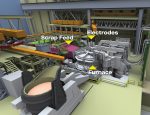Landmark carbon reduction project powers ahead
From February issue of NZ Manufacturer magazine. www.nzmanufacturer.co.nz Around 70% of world’s steel is produced from iron ore reduced in blast furnaces. Most of the remaining 30% is produced by minimills, which recycle scrap steel using electric arc furnaces – a proportion set to grow as companies seek to decarbonise their operations. Work is underway at New Zealand Steel to install an electric arc furnace: a move which will shrink the carbon footprint of its Glenbrook steel mill and place the company at the leading edge of low emissions steelmaking worldwide. As the company gears up to celebrate 60 years since it was founded, this crucial upgrade will secure steelmaking – and the corresponding jobs it supports – in New Zealand for the long term. Announced in May 2023, New Zealand Steel’s electric arc furnace (EAF) project will reduce Glenbrook’s carbon footprint by 800,000 tonnes each year and the country’s total annual emissions by 1% from day one. The carbon reductions – equivalent to taking 300,000 cars off the road permanently – will come from replacing the steel mill’s existing oxygen steelmaking furnace and two of the four coal fuelled kilns. Chief Executive New Zealand and Pacific Islands Robin Davies described the project as “a pragmatic response that not only sustains our critical domestic steel supply, but also provides a collaborative approach with public and private sector players to be world leaders in lower emissions steel.” The company is on track to be producing lower carbon steel as soon as 2026, having continued to hit project milestones such as the completion of a feasibility study, beginning to prepare the site for installation and the signing of new project partnerships since the May 2023 announcement. Already users of technologies such as robotics, automation, wireless sensors to collect real-time data and […]


